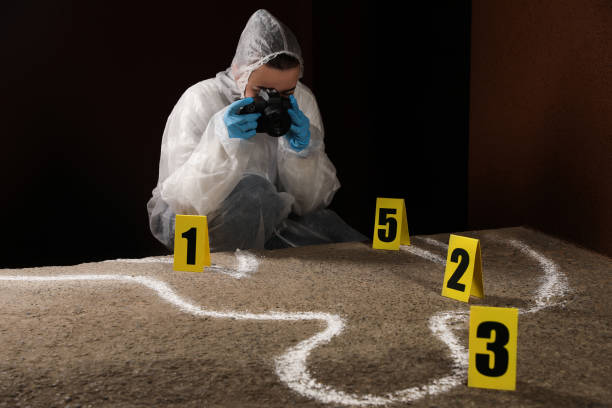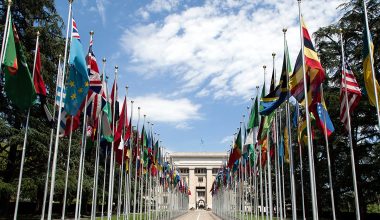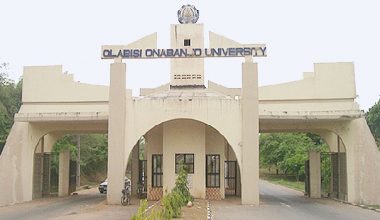Criminology courses in Nigeria are not popular but present good career development opportunities.
Since there aren’t many higher institutions on the continent offering courses in criminology, applicants typically compete to get into these programs.
Therefore, hundreds of thousands of applications are typically received from all over Africa for the top criminology universities in Nigeria.
Our article will provide insights into all you need to know about studying criminology in Nigeria, career prospects, and top universities offering the course.
We will also look at the top 15 Criminology Courses in Nigeria, and the best universities that offer these courses.
Table of contents
- What is Criminology?
- Top 15+ Criminology Courses in Nigeria
- #1. Criminology
- #2. Criminology and Security Studies
- #3. Forensic Science
- #4. Jurisprudence and Social Policy (Criminology track)
- #5. Criminal Justice Policy
- #6. Criminology and financial forensic analysis.
- #7. Investigative Criminology
- #8. Criminology and Criminal Justice
- #9. Crisis and Security Management
- #10. Criminology and Sociolegal Studies
- List of Top Universities Offering Criminology in Nigeria
- 1. University of Jos (UNIJOS)
- 2. Federal University, Duste (FUD)
- 3. Federal University, Oye-Ekiti (FUOYE)
- 4. University of Ilorin (UNILORIN)
- 5. Kaduna State University (KASU)
- 6. Bayero University, Kano (BUK)
- 7. National Open University of Nigeria (NOUN)
- 8. Chrisland University, Owode
- 9. Chrisland University
- 10. Delta State, Western Delta University
- 11. Lead City University, Ibadan (LCU)
- What is required to study criminology?
- How many years of course is Criminology in Nigeria?
- What subjects are required for Criminology in Waec?
- How much does it cost to study criminology in Nigeria?
- Why Should I Study Criminology?
- 3. Improve the safety and well-being of your community
- 4. Understand and share the other side of crime and criminals
- 5. Crime and criminology are constantly evolving
- Criminology courses in Nigeria: FAQs
- Criminology courses in Nigeria: Conclusion
- Re ferences
- Read Also
What is Criminology?
The scientific study of crime is called criminology. Social and behavioral sciences are interdisciplinary fields. This covers research on the reasons behind crime, strategies for preventing it, and studies on law enforcement and the criminal justice system.
Read Also: KWASU Cut Off Mark For All Courses | 2024/2025 Requirements and Fee
Top 15+ Criminology Courses in Nigeria
Below are the top criminology courses in Nigeria.
- MPhil in Criminology
- Criminology and Criminal Justice
- Criminal Justice Policy
- Criminology focus
- Jurisprudence and Social Policy (Criminology track)
- Criminal Justice Policy
- Criminology and Sociolegal Studies
- Crisis and Security Management
- Forensic Science
- Criminology and Criminal Justice
- Criminology
- Criminology and Security Studies
- Investigative Criminology
- Criminology and financial forensic analysis.
- Criminology and Public Prosecution
#1. Criminology
Criminology studies crime and criminal behavior, informed by principles of sociology and other non-legal fields, including psychology, economics, statistics, and anthropology.
While this course may not be seen in some public universities in Nigeria, most light federal, state, and private universities offer this course.
The career path for criminals may not be boldly defined in Nigeria yet, but they can work with law enforcement or law firms to solve criminal cases or understand criminals and the reasons behind their actions.
#2. Criminology and Security Studies
Undergraduate students enrolled in the B.Sc. Criminology and Security Studies Program get foundational knowledge in subjects like victimology, legal theory, criminological theory, social structure and cultural practices, human behavior patterns, and regulatory challenges.
Apart from the core domains of safety, deterrence, and regulation of criminal activity, legal aspects like family, criminal, environmental, immigration, procedural, and constitutional law are addressed.
By looking at how these institutions operate and attempting to assess the social consequences of these policies to suggest new reforms or alternative measures of a more moderate nature and more respectful of human dignity.
This is done to make students more aware of the process through which criminal justice policies (including laws and institutions such as the police, prison, etc.) are created and developed, as well as the theoretical and empirical analysis of the implementation of such policy.
#3. Forensic Science
One essential component of the criminal justice system is forensic science. Investigating and evaluating evidence from crime scenes and other locations, forensic scientists produce unbiased conclusions that can support the investigation and conviction of criminals or clear an innocent party of suspicion.
Through the views of several disciplines, such as economics, political science, philosophy, sociology, history, psychology, and criminal justice, the JSP Program encourages the study of law and legal institutions.
The Jurisprudence and Social Policy Ph.D. is ideal for students interested in:
- The scholarly study of legal ideas and institutions from the standpoint of one or more of the basic disciplines, such as history, economics, philosophy, sociology, or political science.
- Policy analysis and applied research on law-related issues in such fields as criminal justice, poverty and discrimination, human rights, urban planning, and environmental protection.
- Preparation for teaching legal studies in graduate and undergraduate curriculums.
- Interdisciplinary preparation for teaching law.
#5. Criminal Justice Policy
Empirical research and practice should be contrasted in criminal justice policy to provide evidence-based, scientifically sound policy. What constitutes a crime and the appropriate way to deal with persons who commit crimes are established by laws and rules.
The policy is enforceable globally and has conceptual and practical ramifications (i.e., the reification of offense categories).
Policies aim to accomplish particular results, such as a desired improvement in an issue. The purpose of criminal justice policy is to use the legislative process to promote community safety. In other words, the epistemic domain is concerned with formally governing a community through rules and policies.
#6. Criminology and financial forensic analysis.
Forensic Financial Analysis includes both Forensic Accounting (the use of accounting for courts of law) and Fraud Examination, including fraud prevention, fraud detection, fraud investigation, and remediation.
#7. Investigative Criminology
For students who want to work in the rapidly developing field of criminal investigation and possess the knowledge and technical skills necessary to apply themselves in the field, police forces, private investigations, and corporate security, the BSc in Investigative Criminology and Criminal Psychology is the best option.
#8. Criminology and Criminal Justice
The term “criminal justice” describes the legal system used to administer punishment to individuals found guilty of crimes. It contains information about the alleged offense the defendant committed, the arresting law enforcement officials, the legal system that brings charges and represents the defendant, and the punishment the defendant will face if found guilty.
The courts, law enforcement, and organizations that provide supervision and incarceration for criminals collaborate to uphold the rule of law in a community. Systems of criminal justice have existed in one form or another for centuries, though they have evolved.
The study of criminal conduct at the individual and social levels is known as criminology, and it is strongly associated with criminal justice. Criminology is more interested in the philosophical aspects of crime; it focuses on what motivates people to commit crimes, the best strategies for deterring crime and rehabilitating offenders, and the ways that society responds to crime. Criminal justice, on the other hand, is more focused on the mechanisms that society uses to respond to criminal activity.
#9. Crisis and Security Management
Crisis and security management is a highly politicized and contentious topic at the top of the national and international society and governance agenda due to crises brought on by terrorism, war, violence, cyber threats, and natural catastrophes, which dominate world news.
The curriculum for Crisis and Security Management is composed of four courses that integrate professional skills, research abilities, and substantive knowledge.
The curriculum educates students to become reflective, academically trained crisis and security professionals working in the public, private, and civic sectors. It is based on activating working practices and inquiry-based learning.
#10. Criminology and Sociolegal Studies
Students can pursue advanced multidisciplinary study and supervised research experience in the fields of crime, criminal justice administration, and social studies of law and regulation through the study of criminology and sociolegal studies.
Along with developing students’ critical, analytical, and methodological abilities, the curriculum acquaints students with the corpus of current criminological and sociolegal research.
It is not a course in professional legal studies or forensic science training. Instead, it is intended to prepare students for professions in research and teaching, as well as positions where it is desired or essential to be able to critically assess criminological or sociolegal research.
The graduate program is identified with two fields: criminology and sociolegal studies.
Other courses include:
- MPhil in Criminology
- Criminology focus
- Criminology focus
- Criminal Justice Policy
List of Top Universities Offering Criminology in Nigeria
Most degree-awarding universities in Nigeria do not offer criminology programs. Therefore, know schools that have this course and apply in time to increase your chances of getting admitted.
1. University of Jos (UNIJOS)
The University of Jos is the premier academic hub in Africa. In November 1971, it opened as a campus of the University of Ibadan, and in January 1972, it welcomed its first pre-degree students.
The following are the prerequisites for this school’s Criminology & Security Studies program: a maximum of two (2) sittings for Ordinary Level Credits and a minimum of five credits in Senior Secondary Certificate Examinations (SSCE/GCE).
Candidates seeking direct entry should purchase the UNIJOS Direct Entry form from the UNIJOS Portal or JAMB and must have a minimum of a Merit Pass in other Advanced Level Certificates, National Diplomas, and National Certificates of Education.
They must also fulfill additional requirements deemed acceptable by the university’s Senate. Meet the qualifications for entrance into the faculty or department.
Check Out: Official List of Medical Courses in Nigeria | Relevance, Requirements, and Schools
2. Federal University, Duste (FUD)
On February 9, 2011, Federal University Dutse was founded. The university is one of the top criminology BSc and MSc programs in Nigeria.
FUD’s emphasis on study, knowledge development, and the free interchange of ideas draws a varied student body comprising scholars from both domestic and foreign institutions.
This university provides programs that are in high demand, such as a BSc in Security Studies and criminology. For individuals wishing to pursue this degree at FUD, there are two essential entry requirements: a minimum of five credit passes overall (including English and Math) on your O-Level results (WAEC and NECO). a minimum of 200 or higher on your JAMB score.
3. Federal University, Oye-Ekiti (FUOYE)
Students at the Federal University Oye-Ekiti are prepared with innovative talents for the constructive development of the country. Each of the school’s eleven faculties offers a variety of courses. A highly marketable course offered by this school is BSc.
Studies of Criminology and Security. The following are the FUOYE prerequisites for this degree program.
By October 31 of the admissions year, you have to be 16 years old. possess a minimum of five credit passes from your O’Level results (WAEC, NABTEB, or NECO), with no more than two sittings of English and Mathematics.
Meet the Criminology Cut-off Mark for FUOYE. Select the appropriate combination of JAMB subjects. Have a strong post-UTME, WAEC, and JAMB score.
4. University of Ilorin (UNILORIN)
One of the seven universities founded by an order of the federal military administration in August 1975 was the University of Ilorin. For Nigeria, the institution is a trailblazer in academic stability and achievement.
There are nine faculties and six colleges there. To enroll in Unilorin’s Criminology & Security Studies program, you must: At the end of the entrance year, on October 31, you have to be 16 years old.
In your O’Level results (WAEC and NECO), you must have received at least five credit passes, including at least two sittings of English and mathematics. Select the appropriate combination of JAMB subjects. Achieve the UNILORIN JAMB cut-off score. Have a strong post-UTME, WAEC, and JAMB score.
Read Also: Wigwe University Courses and Fees | All You Need to Know About the School
5. Kaduna State University (KASU)
On May 21, 2004, Kaduna State University was founded by Kaduna State Law. It boasts more than 39 departments, seven faculties, and a library with over 17,000 volumes of books.
A few prerequisites for entrance to KASU’s Criminology and Security Studies program are: a minimum of five SSCE credit passes, with no more than two sittings, in the following areas.
English language, math, economics, and any two arts or social science disciplines. Reach the required minimum UTME/JAMB cut-off score. Meet the standards of the department, faculty, and senate at KASU.
6. Bayero University, Kano (BUK)
In 1975, Bayero University Kano was founded. It began as a tiny institution offering training programs at the Advanced Level and grew into one of Nigeria’s most prestigious colleges with a criminology department.
To enroll at Bayero University Kano’s criminology program, you must: possess a minimum of five credit passes from your O’Level results (WAEC, NABTEB, or NECO), with no more than two sittings of English and Mathematics.
By October 31 of the entrance year, you must be 16 years old. Introducing the BUK Criminology Cut-off Mark. Select the Accurate JAMB Subject Compilation. Have a strong post-UTME, WAEC, and JAMB score.
7. National Open University of Nigeria (NOUN)
Among Nigerian universities that provide criminology, the National Open University of Nigeria is unique. It is one of the biggest universities in the sub-Saharan region of West Africa. The school customizes programs to be available, adaptable, and accessible to students at all times.
The following are some prerequisites for the B.Sc. in Criminology & Security Studies at NOUN: Admission is available for candidates at the 100-level. a minimum of five O-Level credits. For O’Level, English language and mathematics are required courses.
Any further O-Level courses that are pertinent. A Levels in the majority of subjects with a minimum grade of C.
Read Also: 30+ Diploma Courses in Canada for International Students
8. Chrisland University, Owode
On September 17, 2015, Dr. Winifred Awosika founded Chrisland University. There was a small delay even though the institution was supposed to open ten years ahead of schedule. The following are the major prerequisites for this school’s BSc in Criminology & Security Studies: VIEW ALSO Africa’s top agricultural university, FUNAAB, has been crowned.
- Five (5) O’Level credit passes (or equivalent, encompassing any two (2) Arts or Social Science UTME requirements as well as Mathematics, Economics, and English Language).
- A minimum of two (2) A Level passes in Economics and any one of the following subjects is required for Direct Entry
- Agricultural Science, History, Statistics, Geography, Physics, Chemistry, Accounting, Business Management, and Government.
9. Chrisland University
On September 17, 2015, Dr. Winifred Awosika founded Chrisland University. There was a small delay even though the institution was supposed to open ten years ahead of schedule. The following are the major prerequisites for this school’s BSc in Criminology & Security Studies.
- Five (5) O’Level credit passes (or equivalent, encompassing any two (2) Arts or Social Science UTME requirements as well as Mathematics, Economics, and English Language).
- A minimum of two (2) Level passes in Economics and any one of the following subjects is required for Direct Entry: Agricultural Science, History, Statistics, Geography, Physics, Chemistry, Accounting, Business Management, and Government.
10. Delta State, Western Delta University
Situated in Oghara, Delta State, Western Delta University is a private university. The National Universities Commission (NUC) gave its approval for the school’s establishment in 2007. The following are the WDU prerequisites for a BSc in Criminology & Security Studies.
- Hold credit passes in five (5) subjects, including mathematics, English language, and any one of the following: geography, government, or economics (no more than two sittings).
- Possess a UTME/JAMB cut-off score that is acceptable. Fulfill additional departmental, professor, and senate requirements at WDU.
11. Lead City University, Ibadan (LCU)
In Ibadan, there is a private university called LCU. The institution is renowned both domestically and globally as one of the top colleges in Nigeria that offers criminology.
VIEW ALSO Nigeria’s blacklist of foreign universities grows as Tinubu’s administration cracks down on phony certifications Every academic program offered by Lead City University is quality guaranteed both in Nigeria and by foreign external examiners.
A GCE O/L, SSCE/NABTEB/NEC, or equivalent credit level pass in five (5) courses, including English language and mathematics, attained at no more than two sittings, is one of LCU’s requirements for a BSc in Criminology and Security Studies.
Read Also: Yusuf Maitama Sule University Courses, Fees, and Requirements | 2024
What is required to study criminology?
The general requirements and subjects needed to study criminology in Nigeria are:
The O’Level requirements
- A minimum of 5 credits in: English Language Mathematics Economics Any two subjects from Arts or Social Sciences (not more than two sittings for History, Civics or Geography)
- Direct Entry Requirements Two “A” Level passes in Government, Economics, Sociology, Geography, Civics, History, and any other (Hausa or IS) IJMB with nine points and above.
- National Diploma in Criminal Justice, Law, or Public Administration, with passes at lower credit or higher grade.
- A first Degree from any recognized university within or outside Nigeria.
Direct Entry requirements
- Two “A” Level passes in Government, Economics, Sociology, Geography, Civics, History, and any other (Hausa or IS) IJMB with nine points and above.
- National Diploma in Criminal Justice, Law, or Public Administration, with passes at lower credit or higher grade.
- A first Degree from any recognized university within or outside Nigeria.
How many years of course is Criminology in Nigeria?
To earn a degree in Criminology and Security Studies a student must obtain stipulated minimum total units of 162 and a maximum of 178 units. The Programme is planned over four years consisting of eight semesters.
What subjects are required for Criminology in Waec?
- Economics
- English Language
- Economics
Any subject from this list:
- Government
- History
- Geography
- Literature in English French
- Hausa/Igbo
- Christian Religious Studies/Islamic Studies
Read Also: List Of University Courses a-z Offered in Nigeria | All Courses Name List
How much does it cost to study criminology in Nigeria?
The cost of studying criminology in Nigeria varies depending on the institution and program type.
Public universities are generally more affordable, with tuition fees ranging from ₦50,000 to ₦150,000 per year for undergraduate programs. Private universities charge higher fees, typically between ₦300,000 to ₦1,500,000 annually.
For postgraduate studies, costs can range from ₦150,000 to ₦500,000 per year in public institutions, while private universities may charge ₦500,000 to ₦2,000,000 or more.
Additional expenses to consider include:
- Accommodation: ₦50,000 – ₦250,000 per year
- Books and materials: ₦30,000 – ₦100,000 per year
- Living expenses: ₦100,000 – ₦300,000 per year
These figures are estimates and can vary significantly. Some universities offer scholarships or financial aid to help offset costs. It’s advisable to check with specific institutions for the most accurate and up-to-date information on fees and expenses.
Why Should I Study Criminology?
Below are some of the reasons why choosing to study Criminology is a good decision:
#1. You can study one of the Criminology subdisciplines
Criminology itself is a broad field of study, but students can choose from a couple of different branches:
- Criminalistics or Forensic Criminology – Deals with collecting samples from crime sites, studying fingerprints, DNA evidence, and so on.
- Victimology or Victim Studies – Deals with the impact of crimes on victims and the roles played by victims before or during criminal actions
Another closely related discipline is Criminal Justice; however, it studies the way criminal justice systems work — police, tribunals, courts, prisons — without focusing on why crimes happen or on their impact.
Nevertheless, it overlaps with punishment and correction, which are essential areas of study for criminologists.
2. Criminologists have exciting and well-paid jobs
It is everything but dull to try to comprehend criminals and the reasons behind their violent, immoral, or frightening acts. Criminologists who work in this field are frequently required to possess knowledge in other fields, such as psychology, sociology, anthropology, and biology.
Strong research abilities enable criminologists to serve as experts or consultants in public policy, assisting national and local governments in enacting legislation that shields the public from harm and deters future crimes.
Now, let’s take a look at some of the most popular Criminology jobs. We’ve also included the average salaries in the US based on data from PayScale:
- Public Policy Analyst – 59,300 USD/year
- Detective – 66,300 USD/year
- Social Worker – 48,600 USD/year
- Probation Officer – 44,400 USD/year
- Forensic Psychologist – 72,370 USD/year
3. Improve the safety and well-being of your community
You can make a significant contribution to the decrease in criminal activity in your neighborhood as a criminologist. However, due to the interdisciplinary nature of criminology, you cannot accomplish this on your own.
Working together with law enforcement, the police, and occasionally social work associations and other governmental bodies will be part of your job.
This is so that you can prevent crimes by first knowing why they happen. For instance, locking up criminals won’t ultimately resolve the issue if your town’s theft and robbery rates are mostly caused by poverty.
You must work with other professionals to lower the rate of poverty and assist individuals in obtaining necessities for survival, such as food, shelter, health care, security, and education.
It’s a lot easier said than done, but if enough people like you are involved and if you can see the bigger picture, it is very much possible.
Most people have an emotional response that is (negative) when they think about crimes and criminals. It makes sense, too, considering the serious harm and loss that lawbreakers can inflict on other members of the community.
But this is just one perspective on the matter. As they say, “It’s easy to curse the dark, but hard to light a candle.” Criminals have motivations for their actions. There could be a multitude of reasons for this, such as bullying, social marginalization, toxic or abusive households, or any combination of these.
Even if these elements don’t justify or serve as an explanation for their behavior, they do provide us with a better understanding of the criminal’s psyche and allow us to hear their side of the tale.
5. Crime and criminology are constantly evolving
The constant advancement in the field of criminology is one of the most fascinating parts of studying it. There is crime everywhere in the globe, and as modern society and technologies advance, so do the instruments and strategies employed by criminals.
For example, individuals who were falsely accused in the past have been freed and some previous verdicts have been reversed as a result of modern forensic techniques and technology.
The fact that 20 or 30 years ago there were no such things as cybercrime, data breaches, online identity thefts, online scams, and so forth is another excellent illustration of the progress made in this field. However, these days, cyber crimes are just as dangerous—if not more so—than traditional offenses for the following reasons:
- we are all connected online, and we share details about our personal lives
- important infrastructure systems depend on computers
- we order products and make payments online
It is now the responsibility of criminologists to comprehend this relatively new class of criminals and find strategies for reducing crimes that occur in the virtual world.
Read Also: List of Nasarawa State University Courses and Fees | 2024 Admission Requirements
Criminology courses in Nigeria: FAQs
Criminologists can work in EFCC, ICPC, and many other Para-military and non-paramilitary anti-crime institutions in the country.
Yes, a criminologist can become a soldier in Nigeria.
The PhD is the highest degree awarded within the field of criminology
List of Jobs for Criminology Field
Judge. $128,710. The top-paying profession in criminology happens to be a judge. …
Attorney. $127,990.
FBI Specialist. $100,000.
FBI Agent. $93,970.
Criminologist. $92,910.
Financial Examiner. $81,410.
Intelligence Analyst. $72,429.
Forensic Psychologist. $72,285.
Criminology courses in Nigeria: Conclusion
Criminology is a wide course that transcends different areas and environments. The universities listed above offer the best criminology courses in Nigeria with a core practical curriculum approach to learning.
So if you were wondering which universities in Nigeria you should have applied to for a Crimilogy course, we’d like to think we have done our best to answer these questions.
References
- www.legit.ng – Universities offering Criminology in Nigeria in 2024 (and entry requirements)
- Criminal Justice in Nigeria – edurank.org
- www.mastersportal.com – Top 5 Reasons to Study a Criminology Degree in 2024
Read Also
- List Of University Courses a-z Offered in Nigeria | All Courses Name List
- 25+ Best Courses to Study In Nigeria | 2024
- List of Public Administration Courses in Nigeria | Universities and Requirements
- List of FUTA Cut off Mark for all Courses 2024 | Fees
- UNICAL Cut Off Mark For All Courses | 2024/2025 Admission Requirements and Fees






